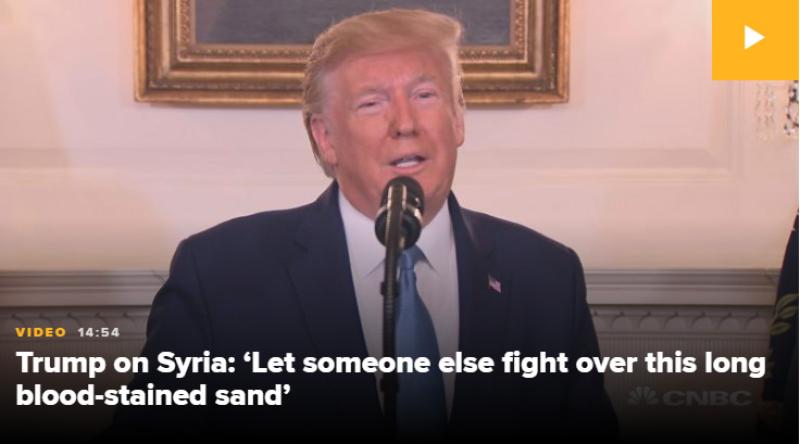Trump says Turkish cease-fire in Syria is ‘permanent,’ and he will lift sanctions

President Donald Trump announced Wednesday he is lifting sanctions on Turkey imposed after it invaded northern Syria. He said Ankara has guaranteed that a temporary cease-fire in the area will be “permanent.”
“The sanctions will be lifted unless something happens that we are not happy with,” Trump said at the White House.
He said that the five-day cease-fire announced on Thursday will “indeed be permanent,” though he noted that “you would also define the word ‘permanent’ in that part of the world as somewhat questionable, we all understand that, but I do believe it will be permanent.”
Trump used the address to fire back against criticism, leveled even by members of his own party, that slammed his decision to pull American forces out of northern Syria as a major geopolitical misstep. The move abandoned the U.S.-backed Kurds, who led the ground fight against the Islamic State terrorist group’s caliphate, and delivered territory and influence to regional foes.
“Let someone else fight over this long blood-stained sand,” Trump said.
“The same people that I watched and read giving me and the United States advice were the people that I have been watching and reading for many years. They are the people who got us into the Middle East mess, but never had the vision or the courage to get us out,” Trump said. “They just talk.”
He said the announcement of a permanent cease-fire “validates our course of action with Turkey that only a couple of weeks ago was scorned.”
The president’s comments came hours after after Russian troops advanced toward northern Syria to facilitate the withdrawal of the Kurdish-led Syrian Democratic Forces fighters from the area. The Russian troops will help patrol the border area on the Syrian side of the Turkish border, according to Russian state media.
Russian President Vladimir Putin and Turkish President Recep Tayyip Erdogan struck a deal on Tuesday to jointly patrol the border zone formerly occupied by the Kurds, following hours of negotiations between the two leaders in the Russian city of Sochi.
The Kurdish forces, which Erdogan views as terrorists, were pushed from northern Syria by Turkish fighters following Trump’s abrupt withdrawal of troops from the zone earlier this month.
Republican and Democratic lawmakers warned that Trump’s unanticipated move will strengthen the influence of American adversaries, including Russia, and possibly boost the Islamic State group, which has thousands of members detained in the area in prisons overseen by the Kurds.
Kurdish forces reported shortly after the Turkish operation began that hundreds of suspected IS members escaped the Ayn Issa camp in northern Syria and that attacks were being launched by the group’s “sleeper cells.” The escapes could not be independently confirmed by CNBC.
Trump said Wednesday that the IS fighters have “been largely recaptured” and that the group was “under very strict lock and key.”
Earlier Wednesday, James Jeffrey, the State Department’s special envoy for Syria, testified to House lawmakers that more than 100 IS fighters had escaped.
“We do not know where they are,” Jeffrey said.
Following Wednesday’s announcement, Trump retweeted an account appearing to belong to a spokesperson for the Syrian Democratic Forces. According to the account, SDF commander Gen. Mazloum Kobani thanked Trump “for his tireless efforts that stopped the brutal Turkish attack and jihadist groups on our people.”
“Thank you General Mazloum for your kind words and courage,” Trump wrote in a subsequent tweet. “Please extend my warmest regards to the Kurdish people. I look forward to seeing you soon.”
Tags
Who is online
131 visitors



The civil war in western Syria has ended, there hasn't been a Kurdish genocide, ISIS is still contained, Syrian refugees are now set to be repatriated, and the region has become more stable. That wasn't accomplished by maintaining a US military presence. The generals, diplomats, and neo-con policy wonks appear to have been wrong; the US military leaving the region really has achieved stability.
The press has gone silent. The dire consequence opined by the highly paid, well informed punditry has proven to be nothing more than hot air. And to make the failure of the press even more stark, the Kurdish leaders are thanking the United States.
To be sure, this outcome was not the result of a carefully crafted strategy by Donald Trump. The United States did not dictate a resolution as neo-con policy wonks desired; the stakeholders in the region found a resolution. Trump has allowed the region to resolve its own conflicts without US interference, much to the dismay of the press and status quo politicians. Trump seems to have placed his faith in human nature because, unlike most politicians, Trump seems to better understand human nature.
It seems like a lot of those status quo politicians like the idea of the US solving other people's problems so that they owe us their allegiance in the future.
So, he moved out the troops to get out of war, but left enough to guard the oil. How typical.
Why are our troops guarding another nation's oil ?
Because the bulk of it goes to our supposed "allies" who should be providing some troops and equipment of their own! The US can supply its own oil needs..
DUH!
Ask Trump.
I'll wait to hear from someone who is actually knowledgeable.
The oil is in the Kurdish area and not located near the Turkish border. While it seems that the Kurds are wanting to control the northern watershed that supplies water to the region; oil in the areas claimed by the Kurds provides a source of revenue. That applies to Iraq as well as to Syria.
Water is power in the Middle East but oil provides the means. The question is who benefits from the US guarding the oil fields?
For the what seems to be like the 100th time.
1)We were never in Syria legally. The Syrian government asked us to leave.
2) ISIS/ISIL is no longer a cohesive military force in Syria. The war on terror is over in Syria. If we want to fight their military branch we have to move on to Lebanon, Jordan, Libya, Afghanistan, and most of Africa. As a terrorist force they will never go away- just like Al Qaeda.
3) Keeping US forces in Syria would accomplish nothing but putting them at risk. Assad will not be removed from power unless Putin wants it. Obama's and Hillary's wet dream is over. There is still a risk of US forces are still at risk if they come under attack from Russian, Iranian, or Syrian Forces. Starting WWIII over Syria would be asinine; but that is what our foreign policy has been for decades, stuck on stupid.
4) In case you missed the US is conducting bombing runs in Syria from Turkey air fields. Where would you suggest the US operated from if we go to war with Turkey? Not to mention how would you pull out our troops and equipment from Turkey in the process? Iraq already said no to the troops, and planes, conducting operations into Syria from Iraq. Sending another air craft carrier and more troops will put them into direct conflict with Russia, China, Iran, and Syria- and as stated starting WWIII over Syria would be asinine.
5) Saudi Arabia is a US ally that is fighting the Iranian backed Houthi in Yemen. They are trying to put a pro Western government back in charge of Yemen that was removed by a violent coup.
6) Saudi Arabia asked the US to help them protect their oil fields from drone attack. Destabilizing the world if the oil fields go down is not an option.
7) Whatever happened to Iran controlling the ME? Think Yemen is not a part of the ME? Want to hand it over to Iran like Bush Jr did with Iraq, and Obama did with Syria?
8) Saudi Arabia moving closer to Russia. The last thing we want is increased Russian influence in Saudi Arabia. Helping them protect their oil fields will help mend a few fences.
ISIS/ISIL is no longer a cohesive military force in Syria.
They weren't until Trump gave them the keys to the gate.
100 to 200 US troops have been replaced by a Turkish army, Syrian Defense Forces, Russian patrols, and the Kurds remain in the area. Those replacements have not shown themselves to be as squeamish as the United States when dealing with terrorists. Even the press has highlighted 'atrocities'. How do you think forces in northern Syria will treat ISIS?
Without US interference, the forces in the region are capable and, apparently, willing to eliminate ISIS permanently. If anything, ISIS will strengthen alliances between the Turks, Syrians, Kurds, and Russians.